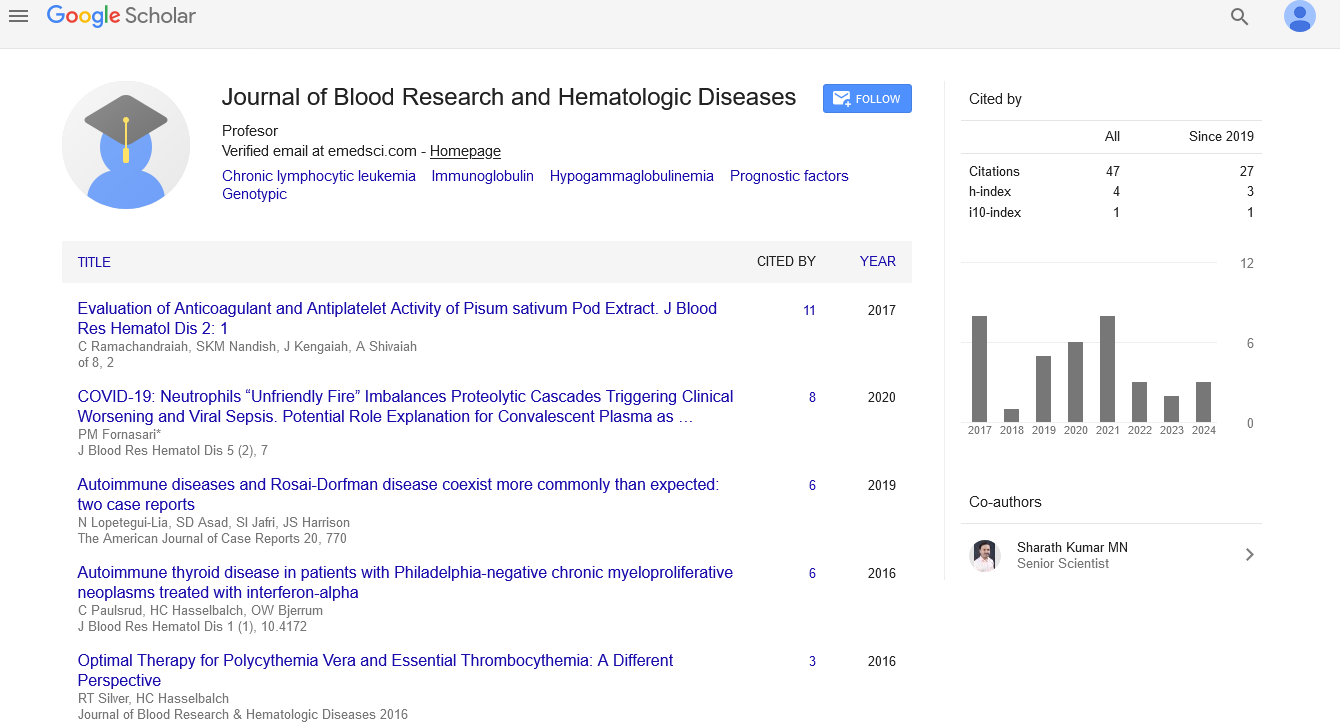Commentary, J Blood Res Hematol Dis Vol: 8 Issue: 3
Emerging Trends in Lymphoma Immunotherapy: CAR-T Cell and Checkpoint Inhibitor Approaches
Nikos Papadopoulos*
1Department of Biomedical and Neuromotor Sciences, University of Bologna, Bologna, Italy
*Corresponding Author: Nikos Papadopoulos,
Department of Biomedical and
Neuromotor Sciences, University of Bologna, Bologna, Italy
E-mail: nikos.papadopoulos@gmail.com
Received date: 28 August, 2023, Manuscript No. JBRHD-23-115307;
Editor assigned date: 30 August, 2023, PreQC No. JBRHD-23-115307 (PQ);
Reviewed date: 13 September, 2023, QC No. JBRHD-23-1153067
Revised date: 21 September, 2023, Manuscript No. JBRHD-23-115307 (R);
Published date: 28 September, 2023, DOI: 10.4172/jbrhd.1000178
Citation: Papadopoulos N (2023) Emerging Trends in Lymphoma Immunotherapy: CAR-T Cell and Checkpoint Inhibitor Approaches. J Blood Res Hematol Dis 8:3.
Description
Lymphoma, a group of blood cancers that affect the lymphatic system, has historically posed significant challenges to treatment. However, recent advances in immunotherapy have brought new hope to patients with lymphoma. Among the most promising approaches are Chimeric Antigen Receptor T-cell (CAR-T cell) therapy and checkpoint inhibitor immunotherapy.
CAR-T cell therapy
Chimeric Antigen Receptor T-cell therapy, or CAR-T cell therapy, is an innovational immunotherapy technique that involves modifying a patient's own T-cells to target cancer cells. This approach has shown remarkable success in treating certain types of lymphoma, particularly B-cell lymphomas.
How CAR-T cell therapy works: The process begins by collecting a patient's T-cells, which are immune cells responsible for recognizing and attacking infected or cancerous cells. These T-cells are then genetically engineered to express a Chimeric Antigen Receptor (CAR) on their surface.
CAR structure: The CAR is designed to recognize a specific antigen found on the surface of lymphoma cells, such as Cluster of Differentiation 19 (CD19). Once the CAR-T cells are infused back into the patient, they can precisely target and attack cancer cells expressing the targeted antigen.
Clinical success: CAR-T cell therapy has demonstrated remarkable success in clinical trials for lymphoma, with high response rates and durable remissions in patients who had previously exhausted other treatment options.
Challenges: Despite its promise, CAR-T cell therapy is not without challenges, including potential side effects such as Cytokine Release Syndrome (CRS) and neurotoxicity. Investigation is ongoing to enhance the safety and effectiveness of this therapy.
Checkpoint inhibitor immunotherapy
Another promising approach in lymphoma immunotherapy is the use of checkpoint inhibitors. These drugs are designed to release the brakes on the immune system, allowing it to mount a more effective attack against cancer cells.
Checkpoint proteins: Checkpoint inhibitors target specific proteins on the surface of immune cells and cancer cells. One of the most well-known pairs of checkpoint proteins is Programmed Cell Death Protein 1 (PD-1) and Programmed Cell Death Ligand 1 (PDL1).
Mechanism: In lymphoma, cancer cells can exploit these checkpoint proteins to evade the immune system. Checkpoint inhibitors block the interaction between these proteins, reactivating the immune response against the cancer.
Approved therapies: Several checkpoint inhibitors have been approved for the treatment of lymphoma, including nivolumab and pembrolizumab. These drugs have demonstrated efficacy in patients with relapsed or refractory lymphoma.
Combination therapies: Experts are exploring combination therapies that combine checkpoint inhibitors with other treatments, such as chemotherapy or targeted therapies, to enhance their effectiveness.
CAR-T Cell therapy vs checkpoint inhibitor immunotherapy
Both CAR-T cell therapy and checkpoint inhibitor immunotherapy offer significant promise in treating lymphoma, but they differ in several key ways:
Targeting: CAR-T cell therapy directly targets cancer cells expressing a specific antigen, while checkpoint inhibitors act more broadly by releasing the brakes on the immune system.
Patient selection: CAR-T cell therapy requires patients to have specific antigen expression on their cancer cells, limiting its applicability. In contrast, checkpoint inhibitors can be used in a wider range of lymphoma cases.
Response duration: CAR-T cell therapy has demonstrated longerlasting responses in some patients, including potential cures, while the durability of checkpoint inhibitor responses may vary.
Side effects: The side effects associated with each therapy differ. CAR-T cell therapy may lead to CRS and neurotoxicity, whereas checkpoint inhibitors can cause immune-related adverse events affecting various organs.
Future directions and challenges
The emergence of CAR-T cell therapy and checkpoint inhibitors has transformed the landscape of lymphoma treatment. However, challenges and opportunities lie ahead:
Combination therapies: Investigating the synergy between CART cell therapy and checkpoint inhibitors is an area of active studies. Combining these approaches may enhance treatment outcomes.
Patient selection: Identifying biomarkers that predict response to these therapies is essential to tailor treatment strategies for individual patients.
Overcoming resistance: Some patients may develop resistance to these therapies over time. Understanding the mechanisms of resistance and developing strategies to overcome it are important.
Safety: Improving the safety profiles of these therapies, especially CAR-T cell therapy, is vital to minimize side effects.
Conclusion
The advent of CAR-T cell therapy and checkpoint inhibitor immunotherapy has ushered in a new era of hope for patients with lymphoma. These innovative approaches offer the potential for durable remissions and even cures, particularly in cases where traditional treatments have failed. As studies continues to advance and our understanding of these therapies deepens, the future holds the promise of more effective and personalized treatments for individuals battling lymphoma. Immunotherapy is changing the prognosis for lymphoma patients and redefining the possibilities of cancer treatment.
 Spanish
Spanish  Chinese
Chinese  Russian
Russian  German
German  French
French  Japanese
Japanese  Portuguese
Portuguese  Hindi
Hindi 